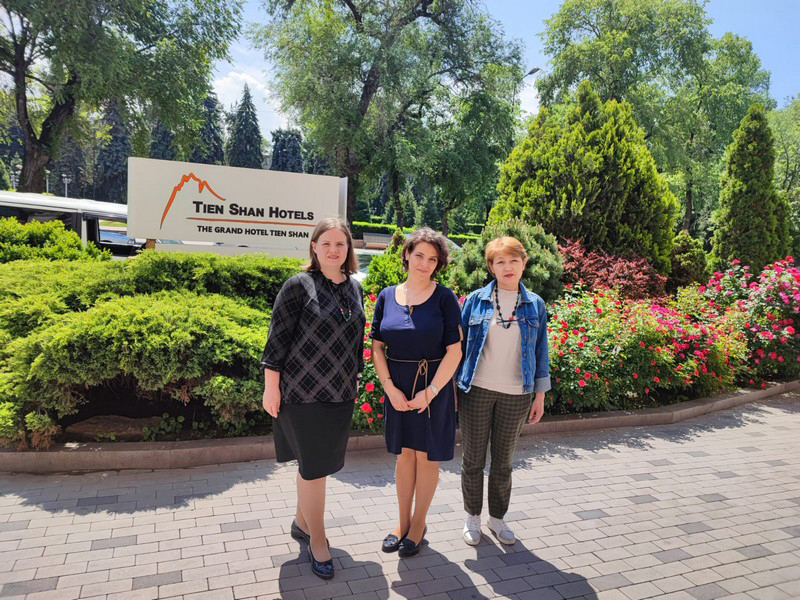The summer season of domestic tourism in Kazakhstan is now in full swing. The KTA and КАГиР team visited some rest bases and hotels in iconic tourist destinations in the Almaty region. Questions about how and why the trip was made were posed to Tatiana Khodorovskaya (КАГиР):
What were the main goals of the trip?
– The Kazakhstan Association of Hotels and Restaurants (КАГиР) and the Kazakhstan Tourist Association (KTA) work as a part of the consortium, which is implementing the international European project SUSTOUKA, financed by the European Union. The main objective of the project for tourist accommodation facilities is to train them in sustainable consumption and production (SCP) practices and to provide them with the knowledge to implement them, in order for them to work more sustainably and contribute to environmental protection by reducing water, energy and waste consumption.
The focus group among MSMEs in the tourist accommodation sector of Almaty city and Almaty region. Hotels in Almaty city and Almaty region, located in such tourist destinations as Talgar, Saty village, which is near the Kolsai Lakes, Karatal, Bashy near Altyn-Emel National Park, a hostel in Kapchagai, Akshi on Lake Alakol and in Lepsinsk village in Zhongar Alatau National Park, and “Oi Qaragai” resorts and accommodation facilities in Chimbulak.
From May 12 to June 25, the first study and monitoring visits to the selected focus group of 50 MSMEs of tourist accommodation sector took place. The purpose of the visits was to familiarize entrepreneurs with the procedure of introducing PPM practices, filling out entry questionnaires to assess the current state, inspect the territory, pass the training manual on SCP practices, which gives the basics of their application and pass the list of low-cost SCP practices that are most easy to apply now. On the second monitoring visit with the team of KTA and КАГиР experts in the field of implementation of SCP practices will travel for personal professional advice.
Does the activity of hotels and resorts meet the environmental standards of SUSTOUKA? Can we say that they contribute to the development of eco-tourism in Kazakhstan?
– For the most part, businesses themselves are already willing to implement SCP practices, with 95% everywhere installed energy-saving light bulbs. After all, high consumption of energy, water – it’s a significant cost to pay for utilities. Entrepreneurs themselves are interested in reducing consumption. However, there are things which have to be worked on: while the city hotels are more or less in order, leaving the city there are no garbage processing plants and the garbage ends up in the local landfill, but taking the garbage 600 km away is not profitable; there is not enough electricity in the city, businessmen face frequent blackouts; not everybody has meters for water and not everybody knows how to calculate the consumption per guest. So there is work ahead of us all together.
Certainly, if you introduce all the criteria, it will contribute to the development of eco-tourism in Kazakhstan. Today there is a worldwide preference of tourists to choose ecological means of accommodation.
Did they take advantage of the green credit opportunity? If not, what are the reasons? Maybe they want to, but the interest rates are high?
– So far we have only studied this question. We conducted a survey of entrepreneurs who would like to take green loans for development. In general, entrepreneurs are interested in this topic, but all refer to the high interest rates and a long procedure of documentation review, they want to understand the profitability of the introduction of green technology, for example, to see how solar panels, solar collectors, if purchased. The project team faces the task of facilitating access to green finance through working with government agencies and financial institutions. Tentatively, in November we plan to hold B2B meetings for entrepreneurs with financial institutions, so they can take advantage of the proposed green finance programs.
Can we point out a particular hotel, base, or on average the situation is general in terms of conditions?
– During the visits we saw a variety of SCP practices used. Almost all use energy-saving lighting, motion sensors are widespread, solar-powered street lights, some have automatic irrigation, there is a guest house in Lepsinsk village, which itself takes glass bottles from locals for 1 tenge, how glass does not go to landfills, and from the accumulated material makes screed for the floor, this practice can help other accommodation facilities located away from the city, where there are companies accepting for recycling waste.
It may be noted that, in general, all of the tourist accommodation facilities in our focus group employ some form of SCP practices.
How relevant to them is the SUSTOUKA project program?
– The cost of utilities for some enterprises reaches 40%, so saving for them is relevant, the proposed practices when applied will reduce the consumption of energy, water, waste by 25% – this is a significant savings, so the SUSTOUKA project program is very relevant for them.





